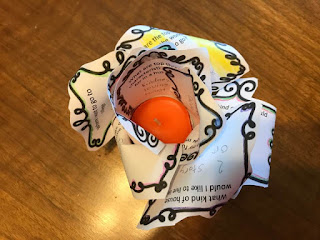One Thousand Questions
Since bringing our girls home, we have "enjoyed" many MANY questions. It is a bit like living with a toddler who constantly asks questions to understand the world. We initially thought the questions were driven by a "poverty of experience" in their early childhood. Questions are most prominent when we watch movies. One particular daughter asks a constant stream of questions when we watch movies. She can't wrap her brain around the relationships between characters or make inferences about what is happening in the plot. From one moment to the next she forgets who a character is or why they behave the way they do. She is always interested to know which characters "like each other" and often makes hilarious guesses about the romantic interests of characters. For example, we were watching a movie where the young man's mother was featured prominently in the storyline. We had discussed who this character was. Even so, during one scene between the mother and son, my daughter innocently asked "Do they like each other?" (meaning romantically).
As time has worn on in parenting our children, we have discovered that the questions might be a signal or a symptom of something larger. Perhaps she isn't just trying to understand the world. Perhaps she has a disability in language. We are looking into the possibility that she isn't just ditzy, but rather cannot make inferences or fully comprehend what people are saying to one another due to a disability. It makes her silly questions less hilarious and more disconcerting.
This has been a challenge for me to deal with in particular. I grew up in a family that excels in language. My mother is a writer, my brother works for a newspaper company, and my dad once read the dictionary for fun. As children, my brother and I grew up with words. We were exposed to large words and weren't always given the definition -- we learned the meaning of these words through context clues. My brother and I both grew up with large vocabularies and strong abilities in reading and writing.
To have a child struggle with understanding language and not having any clue of how to use context clues to infer meaning….it has been a challenge to say the least. It has lead to much frustration as even simple instructions or words sometimes confound her. Homework is very frustrating for us both. Her behavior often comes across as defiant….but may actually be that she never understood what she was asked to do in the first place. She can't explain what she wants or what motivated her choices, which leads her to frustration or consequences.
I've never been so interested in the results of a special education evaluation in my life.
This has been a challenge for me to deal with in particular. I grew up in a family that excels in language. My mother is a writer, my brother works for a newspaper company, and my dad once read the dictionary for fun. As children, my brother and I grew up with words. We were exposed to large words and weren't always given the definition -- we learned the meaning of these words through context clues. My brother and I both grew up with large vocabularies and strong abilities in reading and writing.
To have a child struggle with understanding language and not having any clue of how to use context clues to infer meaning….it has been a challenge to say the least. It has lead to much frustration as even simple instructions or words sometimes confound her. Homework is very frustrating for us both. Her behavior often comes across as defiant….but may actually be that she never understood what she was asked to do in the first place. She can't explain what she wants or what motivated her choices, which leads her to frustration or consequences.
I've never been so interested in the results of a special education evaluation in my life.

Comments
Post a Comment